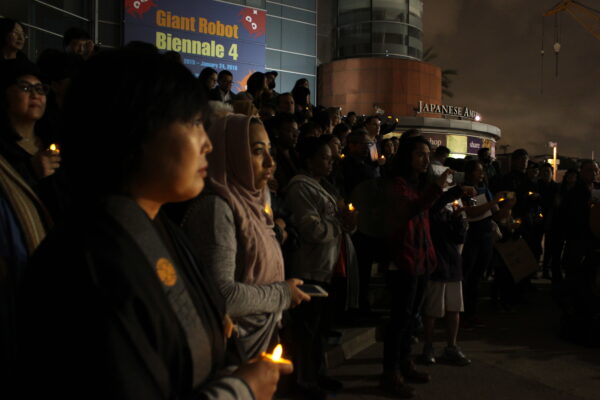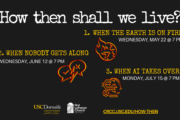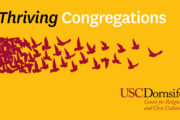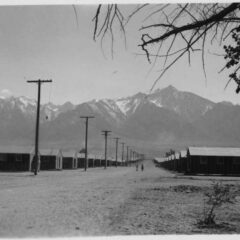Japanese and Muslim American groups, as well as other supporters, gathered for a candlelight vigil in Los Angeles’ Little Tokyo neighborhood to remember the victims of recent terrorist attacks and stand up against Islamophobia in recent weeks. As I explained in this blog post, the internment experience has made Japanese Americans wary of the consequences of Islamophobia since 9/11.
You can read more about the vigil and how the relationship between the Japanese and Muslim American communities developed in my story for Religion News Service:
LOS ANGELES (RNS) After 9/11, Kathy Masaoka heard a Muslim woman on the radio describe her hesitancy to go to the market for fear of being attacked.
“It crystalized for me at that moment, that this must be how my parents felt and how my family felt after Pearl Harbor,” she said.
Masaoka’s family is Japanese American. As a young man during World War II, her father was drafted into the Military Intelligence Service while his parents and siblings were sent to California’s Manzanar internment camp in the desert east of the Sierra Nevada. They lost their family business in Los Angeles.
Masaoka is co-chair of Nikkei for Civil Rights and Redress in Los Angeles, which helped win a presidential apology and $20,000 per person for more than 80,000 survivors of internment in 1988. The experience taught Japanese Americans the benefits of partnering with other communities.
“We couldn’t win redress without reaching out to others,” Masaoka said.
In the wake of the San Bernardino, Calif., and Paris terrorist attacks, leaders of the NCRR and other Japanese-American organizations reached out to Muslims groups offering their help. They are among a raft of grass-roots organizations that have shown solidarity with American Muslims. …
For more images from the vigil, click here.
You can see images from the internment camps in the previous post.
Since writing that post–and also since the Japanese community started organizing the candlelight vigil–the San Bernardino terrorist attack has worsened the backlash against Muslim Americans. This month, reported hate incidents rose to 37 locally, up from an average of four monthly, according to the Council of American-Islamic Relations-LA.
As I wrote for RNS, though, many groups across Los Angeles have shown their solidarity with American Muslims. The mayor hosted an interfaith rally at city hall on Sunday with more than 500 participants.
Rally Against Violence + Extremism #United4HumanityLA pic.twitter.com/q7zFInRDD4
— MPAC (@mpac_national) December 13, 2015
A small group from Abrahamic Faiths Peacemaking Initiative showed up to support Muslims at the Islamic Center of Southern California on Friday.
Even though news organizations continue to ask for “moderate Muslims” to condemn terrorism, such Muslims have long engaged in interfaith groups, charitable activities and political causes to show that they are part of the wider community. (Indeed, one organizer expressed frustration that the mayor’s event received little attention outside of local broadcast news.) Recent events represent years of grassroots relationship-building between diverse communities.
CRCC also helped KPCC understand the difficulty of quantifying the Muslim American community locally and nationally.
Megan Sweas is the editor and director of communications with the USC Center for Religion and Civic Culture.




